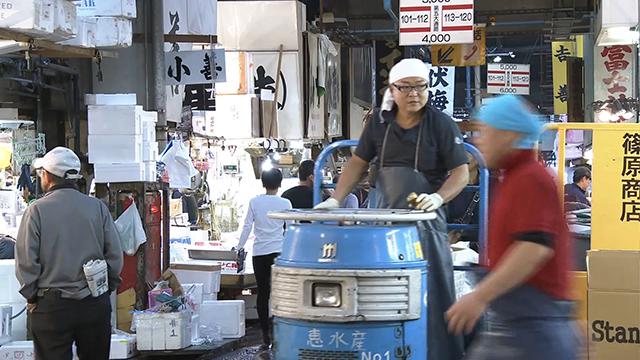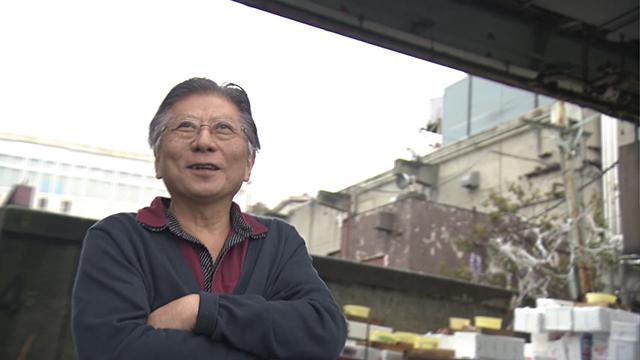
The morning of the last day of operation was busy as usual, with auctioneers calling out prices on tuna and workers driving through narrow corridors on carts loaded with vegetables.
Tsukiji was where fresh food and products were sent in from all corners of Japan, and its fish market was one of the world's biggest.

65-year-old Junichi Ito, a fish wholesaler, worked at Tsukiji for decades. "I was only a child when I first came to Tsukiji to help my father's business. And I spent most of my life here," said Ito. "I do feel a bit sentimental. I might unconsciously walk toward Tsukiji in the morning even after the market is closed."

The area was also home to about 350 restaurants and stores for ordinary shoppers. It was a place where people would search for the freshest food and best products, especially ingredients essential to traditional Japanese cooking like dried Bonito and kelp.
"I'll miss the place. It reminded me of Japan's good old times," a female shopper said.
History of the Tsukiji market

The Tsukiji market was built in 1935, before World War II, in central Tokyo. It eventually developed into a huge center for seafood, vegetable and all kinds of processed food as infrastructure and logistics developed during Japan's period of rapid economic growth.
The Tokyo metropolitan government was in charge of its management. In 2017, over 1,000 wholesalers were doing business in the Tsukiji market.
Controversial relocation plan to Toyosu
Officials of the Tokyo metropolitan government and Tsukiji workers had discussed rebuilding it since the 1960s or 70s because of its aging facilities and lack of space.
Then-Tokyo Governor Shintaro Ishihara decided on a plan to relocate the market to the Toyosu district 2.3 kilometers away in1999.

The planned site was previously used by a gas plant. It is about 407,000 square meters -- 1.7 times larger than the site in Tsukiji.
But public opinion on the relocation was divided as highly-toxic substances were detected in the soil. The relocation plan was finally settled after fierce debate among market workers as well as the Tokyo assembly.
The Tokyo government completed the construction of 3 main facilities in 2016. But when Governor Yuriko Koike took office that year, she revised the facility's safety measures. The Tokyo government had to take additional steps to settle safety concerns and that delayed the opening of new market by 2 years.
Developing Toyosu, redeveloping Tsukiji
Tokyo officials are planning to develop the area surrounding the Toyosu market to make it into a tourist spot by 2023. It will build hotels and shopping facilities.

The Tsukiji market buildings are scheduled to be demolished by February 2020. Officials plan to use the approximately 230,000 square-meter site as a parking lot for the Tokyo Olympics and Paralympics.
But plans following the 2020 Games have not yet been revealed. It's likely to be a key in the redevelopment of central Tokyo.
The fate of the tuna auction


One of the main attractions of the Tsukiji market for foreign tourists was the tuna auction. Years ago, it was only open to the workers, and the public was unwelcome. But a growing number of tourists would enter the auction site, clashing with the workers.
That prompted the Tokyo government to set clear rules for the first time for tourists in 2011. It introduced tours and limited the number of visitors to 120 people a day.
For the Toyosu market, officials plan to allow visitors to watch the tuna auction from January 15th. But they will have to view it through glass windows, unlike at the old site.
Keeping the spirit of Tsukiji

Those who work in the market are now busy with the relocation process.
Yutaka Hayama, a wholesaler who deals with tuna, says that he was reluctant to move to Toyosu. But that changed as many regular customers visited his store one last time before its relocation and said they're looking forward to visiting him at the new market.
"My customers reminded me that the people who worked here tirelessly for 8 decades built trust and turned Tsukiji into a brand. I will never forget that, and will keep doing my best," Hayama says.

Tokyo is a scrap-and-build city, changing rapidly with time. The closing of the Tsukiji market may be an end of an era. But its workers will continue their tireless routine once the bell rings signaling the start of morning bidding, wherever they are.

